“Consider all this: and then turn to this green, gentle, and most docile earth; consider them both, the sea and the land; and do you not find a strange analogy to something in yourself? For as this appalling ocean surrounds the verdant land, so in the soul of man there lies one insular Tahiti, full of peace and joy, but encompassed by all the horrors of the half known life. God keep thee! Push not off from that isle, thou canst never return!” – Herman Melville (1 Aug 1819 – 28 Sep 1891), ending quote from Chapter LVIII (58) of Moby Dick, published 1851, when Melville was 32.
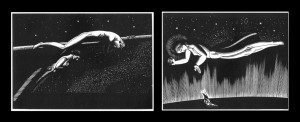 Tonight, Saturday 9 January 2016 • 6:30 • The Plastic Club • 247 S. Camac St. • Philadelphia PA • FREE: an evening of readings from Moby Dick, a conversation with Anders Hansen about Melville’s genius, a screening of the short documentary Three Cheers for the Whale plus, for hardy salts interested in a double bill, a screening of the John Huston 1956 classic with Gregory Peck, to a script written by Huston and Ray Bradbury. Above and below, the magic of Rockwell Kent, artist extraordinaire, whose work has inspired some of my own creativity over the years in subtle, and not-so-subtle, ways…
Tonight, Saturday 9 January 2016 • 6:30 • The Plastic Club • 247 S. Camac St. • Philadelphia PA • FREE: an evening of readings from Moby Dick, a conversation with Anders Hansen about Melville’s genius, a screening of the short documentary Three Cheers for the Whale plus, for hardy salts interested in a double bill, a screening of the John Huston 1956 classic with Gregory Peck, to a script written by Huston and Ray Bradbury. Above and below, the magic of Rockwell Kent, artist extraordinaire, whose work has inspired some of my own creativity over the years in subtle, and not-so-subtle, ways…
 Good ole synchronicity! or is it serendipity?? Regardless, I will not be the only one reading Moby Dick aloud to a (hopefully) attentive audience this Saturday night. The annual read-aloud marathon that takes place at the New Bedford Whaling Museum, Massachusetts – now in its 20th year – starts at noon Saturday, ending twenty-five hours later early Sunday afternoon. It would be interesting to know which chapter the New Bedford crowd will be listening to at 6:30 p.m. Saturday evening, when I commence my reading here in Philadelphia of chapter 1, starting with that classic line: “Call me Ishmael.” Some year I’ll attend the New Bedford reading myself, which has grown in popularity and scope; perhaps I’ll even get to read for ten minutes, although it’s getting harder to land a reading slot, the occasion has gained so in popularity. Personally I think it’s time for Philly to start its own Moby marathon. If we can honor James Joyce with a reading of Ulysses, why not honor Herman Melville with a reading of Moby here in the City of Brotherly Love, considering how Melville’s humanist preoccupations parallel that aspiration? Below a link to a recent Boston Globe article about the reading taking place in New Bedford this weekend.
Good ole synchronicity! or is it serendipity?? Regardless, I will not be the only one reading Moby Dick aloud to a (hopefully) attentive audience this Saturday night. The annual read-aloud marathon that takes place at the New Bedford Whaling Museum, Massachusetts – now in its 20th year – starts at noon Saturday, ending twenty-five hours later early Sunday afternoon. It would be interesting to know which chapter the New Bedford crowd will be listening to at 6:30 p.m. Saturday evening, when I commence my reading here in Philadelphia of chapter 1, starting with that classic line: “Call me Ishmael.” Some year I’ll attend the New Bedford reading myself, which has grown in popularity and scope; perhaps I’ll even get to read for ten minutes, although it’s getting harder to land a reading slot, the occasion has gained so in popularity. Personally I think it’s time for Philly to start its own Moby marathon. If we can honor James Joyce with a reading of Ulysses, why not honor Herman Melville with a reading of Moby here in the City of Brotherly Love, considering how Melville’s humanist preoccupations parallel that aspiration? Below a link to a recent Boston Globe article about the reading taking place in New Bedford this weekend.
https://www.bostonglobe.com/metro/2016/01/05/new-bedford-whaling-museum-host-annual-moby-dick-reading-marathon/2C8B2r2XYPqe7QifhC8e7L/story.html
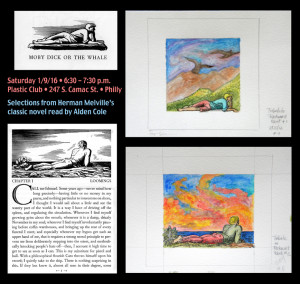 For me personally, Moby Dick is woven inextricably with the illustrations created by Rockwell Kent for a 1930 Random House edition which was responsible for much of the book’s, as well as Melville’s, increased popularity with the public in the 20th century; the novel was not a great success in his lifetime. Two of Kent’s Moby illustrations – from
For me personally, Moby Dick is woven inextricably with the illustrations created by Rockwell Kent for a 1930 Random House edition which was responsible for much of the book’s, as well as Melville’s, increased popularity with the public in the 20th century; the novel was not a great success in his lifetime. Two of Kent’s Moby illustrations – from
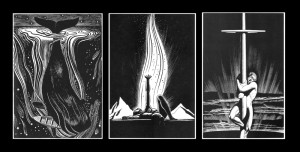 the half-title page and the header for Chapter 1 – inspired two color-drawings of my own, done in Alaska in August of 2012. It was while that there I read this American classic – one of the great masterpieces of English literature – for the
the half-title page and the header for Chapter 1 – inspired two color-drawings of my own, done in Alaska in August of 2012. It was while that there I read this American classic – one of the great masterpieces of English literature – for the
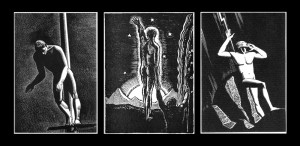 first time. How I avoided this ponderous tome about obsession, while in high school where it is usually de rigeur reading, I don’t know; unless I scoped the Classics Illustrated version, somehow getting away with
first time. How I avoided this ponderous tome about obsession, while in high school where it is usually de rigeur reading, I don’t know; unless I scoped the Classics Illustrated version, somehow getting away with
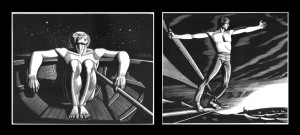 a book report gleaned from such an abbreviated source. Be that as it may, coming to this classic as a mature adult allowed me to feel Melville’s genius in ways that I’m quite sure I would have missed as a teenager.
a book report gleaned from such an abbreviated source. Be that as it may, coming to this classic as a mature adult allowed me to feel Melville’s genius in ways that I’m quite sure I would have missed as a teenager.
“Everywhere that I have been I have had enthusiasm and excitements; I have had the excitements of certain little risks that I have run, the enthusiasm of being where nature was immense, where skies were clear at night, where lands were virginal, I have stood in spots where I have known that I was the first white man who had ever seen that country, that I was the supreme consciousness that came to it. I have liked the thought that maybe there was no existence but in consciousness, and that I was in a sense the creator of that place. And because I have been alone so much and have been moved by what I have seen, I have had to paint it and write about it.” – Rockwell Kent (21 Jun 1882 – 13 Mar 1971) from Wilderness, Kent’s record in word and image of his 7-month sojourn with his 9-year old son Rockwell Jr. on Resurrection Bay in Alaska, published 1920.
More on my love affair with RK’s work in a future posting that will deal with his glorious full-color painting; work that is as powerful in its simplicity, as are his masterful b&w works – both wood engravings and pen-brush-and-ink drawings – a few favorite examples of which illustrate this posting.



{ 0 comments… add one now }